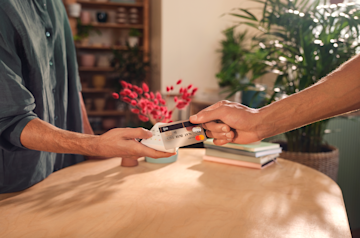
How to make money while decluttering your home
With the right approach, spring cleaning can be a lucrative business – here's how to transform your clutter into cash!
7 min read
Decluttering can be an all-around win — for your home, your mind, and your bank balance. If you put in a small amount of effort, you may be surprised by how much you can make from selling your unused or unwanted stuff. What’s more, selling unused items is great for the environment and can be a springboard to other healthy spending and saving habits. Here, we share tips for how to get started and how to turn a profit on your spring cleaning project.
When it comes to decluttering, a little can go a long way to boosting your well being and bank balance. The most challenging part usually isn’t selling your stuff, but redefining your relationship to the things you own. By changing how you think about your possessions, you can create healthy lifelong financial habits: From spending less, to saving up for the things you truly want And those new habits can turn into significant savings over time. The knock-on positive effects of decluttering can show up in how you shop, your approach to your wardrobe, and your overall financial well-being.A great place to start your decluttering journey is with your wardrobe. For many, wardrobes have become a museum of their former selves. Styles from bygone eras, outfits for a long-ago lifestyle, and items we bought on a whim and quickly forgot we owned — all of these unused clothes might have sentimental value, but they could turned into financial gain.To start decluttering your wardrobe, take a look at each item and ask yourself:A big barrier to decluttering is that we don’t want to let go of items we spent a lot of money on, even if we haven’t used them for years. This is known as the “sunk cost fallacy.” Most of us may have fallen into this way of thinking and acting at one point or another. We continue certain behavior even if the costs don’t outweigh the benefits anymore, because we don’t want to let all of the time, money, or effort we’ve spent be “wasted.” However, when it comes to decluttering, the money that you invested in an item is long gone — whether you use the item now or not. Ironically, holding on to an unused big-ticket item could cost you even more money as it depreciates in value over time, reducing its resale price. By accepting and getting over this quirk of human psychology, you can stand to make a bit of money. What’s more, you may find letting go of these bigger purchases can be freeing. By reselling an expensive item, you could discover it’s easier to let go of many smaller purchases, too. One of the most welcome side effects of decluttering is that it can help cultivate more mindful spending habits. As you become more critical about what possessions are important to you, you may become more conscious of what you bring into your home. Not only can this benefit your living space, but it can also protect your bank balance from overspending. This is a great tool, especially if you’re actively budgeting and working towards specific savings goals.Decluttering can also improve your mental health. A study by the University of Connecticut discovered that reducing clutter decreases stress and makes us feel happier, more relaxed, confident, and focused. Being in a more positive state of mind can improve all areas of your life, which many would argue is priceless.The best way to declutter your home is to approach it in stages. Before diving in, here are a few suggestions to make the process as effortless as possible.
Whether it’s €50 or €500, working towards a decluttering savings goal is a great way to keep yourself motivated as you begin to clean house. To make the goal even more powerful, try tying your goal to something tangible and meaningful like a vacation fund, concert tickets, or travel expenses to see family or friends.
Giving yourself a deadline for getting rid of your clutter is a smart way to prevent yourself from holding on to your unused items. It will also help you move the selling process along and fight the temptation to procrastinate. To keep yourself motivated, keep track of all the items you’ve decluttered and sold. As this number grows, it’s easier to see the progress you've made.Rather than selling items one by one, it might be more efficient to declutter in one big batch. First, separate your unused items into three categories: sell, donate, and recycle. Then start selling or giving your items away. To make things even easier, consider using different boxes for items that’ll be either sold, donated, or recycled. This helps keep everything together and gives you an overview of all your items.You’ll want to think carefully about the best place to sell or give away your different items. A bidding platform like eBay can be a great place to sell in-demand items, but when it comes to used books, it might make more sense to sell them in bulk to a book buy-back site or local bookstore. Used clothes can be sold on online secondhand marketplaces such as Vinted, whereas items from luxury brands could be sold for more at secondhand designer-label platforms such as Vestiaire Collective. However, if the items you want to sell are still in good condition, but you don’t think you’ll be able to sell them for much, consider donating them to charity or gifting them to friends. If you’re selling your unused things online, you'll want to make your items stand out. This means taking bright, clear, nicely styled photos of your stuff in front of a neutral background and describing each item in the most appealing way possible. Of course, you should also be up-front about the condition of each item — an unhappy buyer could negatively impact your trust rating, which could prevent you from making more sales in the future.The process of decluttering and selling your unused items can be time-consuming. While it won’t happen overnight, the long-term benefits of getting rid of your unwanted or unused items can be financially and psychologically rewarding. Entering the process with this in mind can save you from feeling frustrated and demotivated early on and keep you on track as you move towards a more tidy and streamlined life.
Spring cleaning your home? Now’s the perfect time to declutter your finances, too. N26 offers a beautifully simple way of managing your money. Gain a better understanding of your spending habits with Insights and get a monthly snapshot of your financial health with your Monthly Wrap-Up to understand exactly where your money is going. Find the right account for you today.
How to make money from decluttering
Delve into your closet
- Have I worn this item recently?
- Would I feel happy wearing this item today?
- Did I remember I owned this item?
Forget about sunk costs
Declutter for a healthier mind
Making money from decluttering
1. Work towards a financial goal
2. Set a decluttering deadline
3. Declutter in stages
4. Decide where to sell your things
5. Learn how to sell your stuff
6. Prepare to be in it for the long haul
Declutter your finances with N26
Find similar stories
BY N26Love your bank
Related Post
These might also interest youLIFESTYLECould AI help you manage your money?86% of people are open to using AI for financial planning, but is it safe? Learn how AI is already transforming money management, and discover the pros and cons.
4 min read
LIFESTYLEUnderstanding tariffsFrom higher grocery bills, pricier electronics, and stock market swings, tariffs can impact your wallet and your investments.
5 min read
LIFESTYLEDe-hyping the no-spend challengeThis extreme challenge promises to transform your finances, but is it really the game-changer it claims to be?
4 min read



